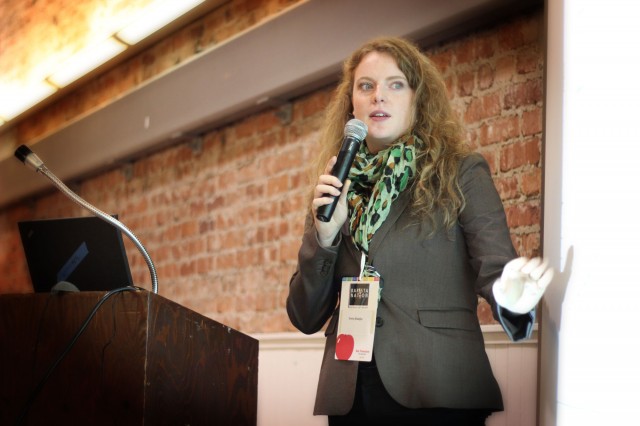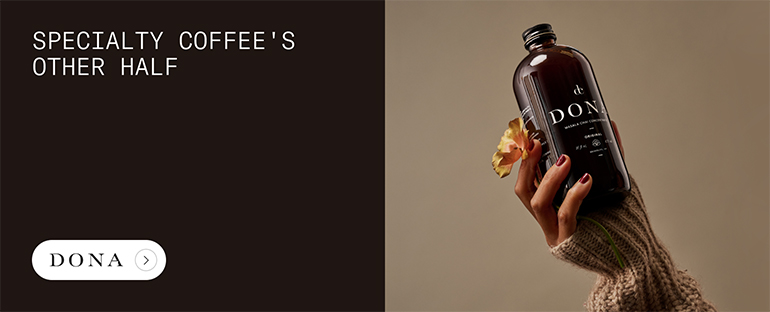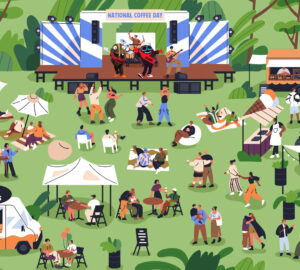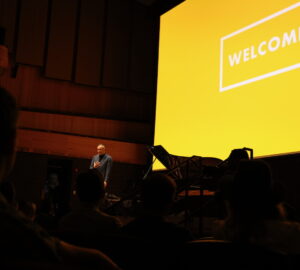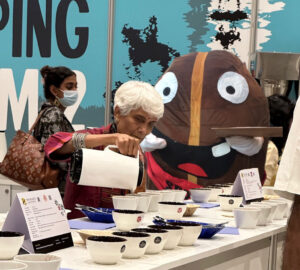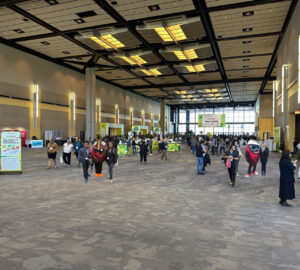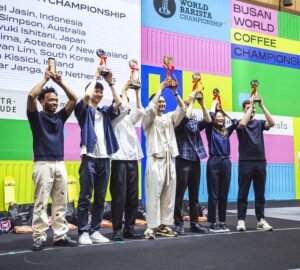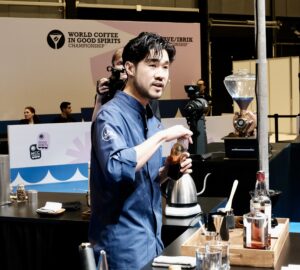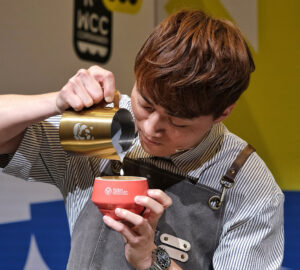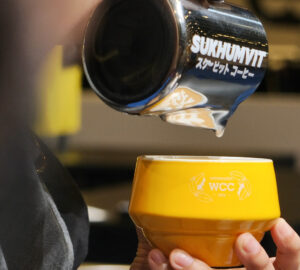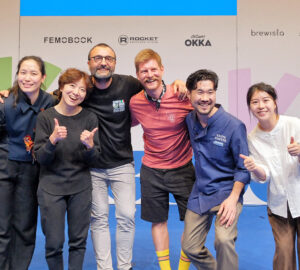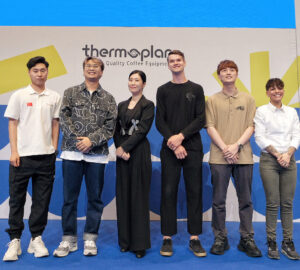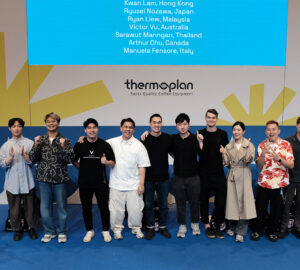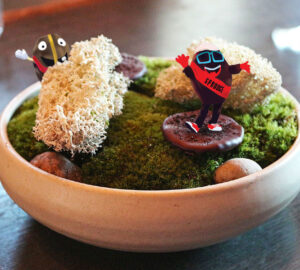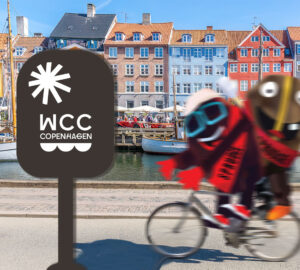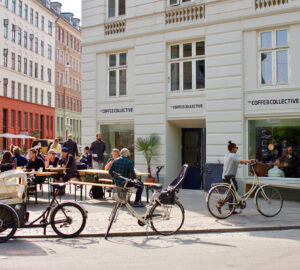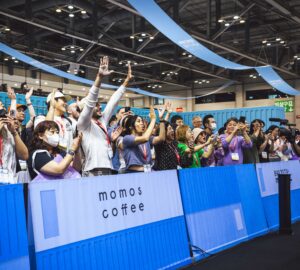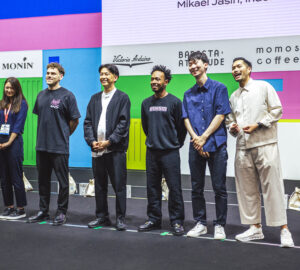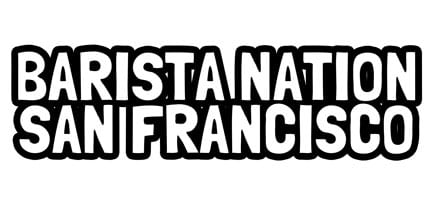
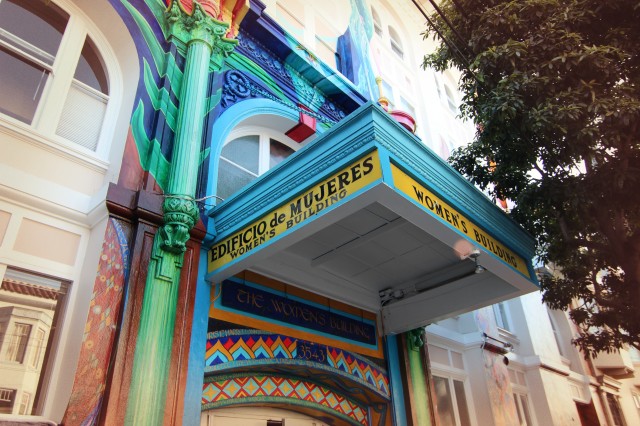
For a birds-eye view of Barista Nation San Francisco, we join Sprudge.com’s intrepid co-founder Zachary Carlsen.
Barista Nation San Francisco was a choose-your-own-adventure kind of affair, at times offering up to three different workshops/lessons/lectures to choose from throughout the day. In total, there were twelve sessions, which means there’s kind of something for everybody – from someone who has spent the last three decades in the industry to someone off the street that happens to like coffee.
I spent most of the day in the main lecture hall, nibbling on complimentary pastries from Proof Pastries, and catching talks from folks like Helen Russell, Emma Bladkya, Katie Carguilo, Devorah Freudiger & Alexandra Littlejohn, Chris Baca & Jared Truby, and a panel lead by Julia Lotecki with Katie Carguilo, Brooke McDonnell, Paola Castellanos, and Eileen Hassi.
Emma Bladkya’s talk was titled Climate Change – A Global Problem For Specialty Coffee. Emma’s new role at the SCAA is an important one, and she’s penned a number of articles for the SCAA Chronicle about the often ignored science side of the coffee world. Climate change is happening, and the way things are going, the future is uncertain. For a crop like coffee, which requires a very specific range in temperatures and rainfall, this will certainly impact crops for generations to come.
Bladkya’s speech wasn’t all doom-and-gloom. She pointed to several methods of reducing our carbon footprint at home. Retail electricity has doubled in CO2 emissions since 1973, and the retail cafe uses a lot of it. Shops have started paying attention to their carbon footprint; some have turned their espresso machines off at night, some have looked into LEED certification, and we’re starting to see carbon footprint issues be addressed by fine espresso machine companies. Expect to hear lots more about this throughout 2013.
An active look at our use in electricity at home can and will help offset C02 emissions, which might help change the course of coffee crops across the globe. You should do it, and so should I.
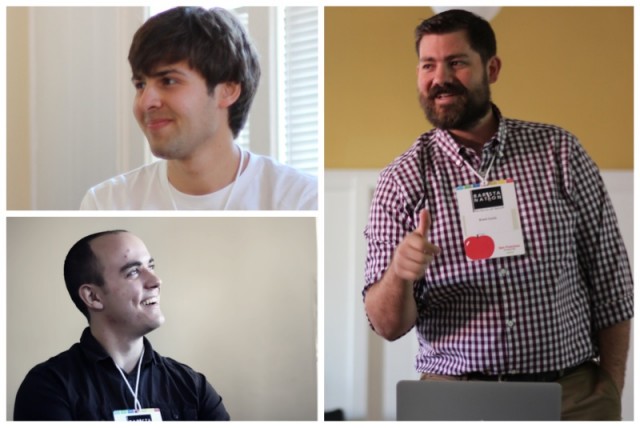
Alex put it simply, “Know what a job entails before you pursue it.” So many baristas dream of one day becoming the mythical green buyer – traveling to source with eight hour drives up steep mountains. Alex asked the crowd, “Do you wanna be a green buyer? You must really like spreadsheets.”
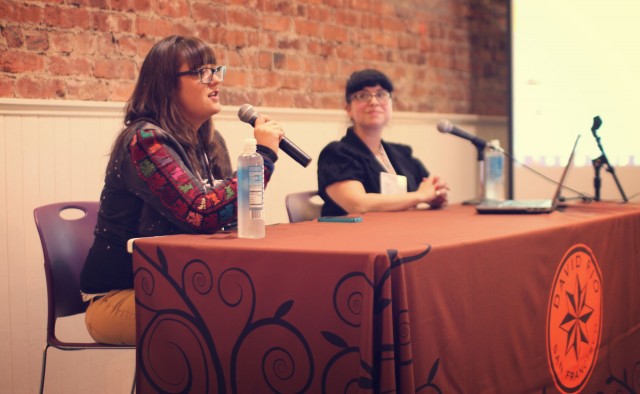
Their point was to make sure “you’re always being honest with yourself and what you like to do.” Roasting? “It’s hot and a little lonely.”
The big takeaway on this talk, and perhaps some of the best advice I’ve ever heard on the topic is to find a mentor, ask them how they got to where they are. In many cases, there wasn’t a job waiting for this person, they created it. Sometimes, the job you think you want is totally wrong for you. Sometimes, you find that the perfect career in coffee is a path that no one’s taken before. (Ed. note: I’m writing this in my pajamas at one in the afternoon with a cat on my lap and Photoshop open with Howard Shultz’s head fused onto a half-naked body builder. This is a long, strange path, man.)

The keynote speaker, United States Barista Champion Katie Carguilo, brought us to tears as she took us on her journey from Barnes and Noble push-button barista to International coffee icon. A funny thing happened on her way to winning top prize at the 2012 USBC. A bump in the road, a shot of espresso dropped in a pint glass of milk…
“The Coffeemaker” was $5. No descriptions or explanations were provided, it was just, do you want it or not? Well, for the people that did.. it was basically the coffee version of the boilermaker. Classy, I know. A shot of espresso, in the shot glass, dropped in a glass of lightly steamed milk (to about 115F, about 3 ounces in all), and then consumed entirely. “Consumed entirely” is just a nice way to say chugged. It wasn’t the most popular menu item, what with it being so mysterious and all, but let me tell you, it was universally enjoyed by those that ordered it. The barista’s full attention was on The Coffeemaker customer, from preparation to consumption. In fact, it was a rule that the barista had to drink a coffee maker along with the customer. Everything would stop for this drink. Every barista had their own way to tell the creation story of the drink. We would describe exactly how to drink it, and what it was going to taste like; at first chocolatey and intense like the espresso, and then the flavor of sweet, creamy milk and espresso would smother the palate.
It actually doesn’t taste as amazing as I’m describing it, but I think what our customers liked about it is that they could tell that we were having fun and they wanted to be part of it. They wanted to be in on the inside joke. Like I’m sure many of you who work in cafes know, our customers liked us not only because we were nice to them and made them good drinks, but also because they could tell that we genuinely enjoyed being baristas and working together. For me, at that time, going to work, making great drinks, forming life long friendships with my coworkers and our customers was really satisfying. There are all kinds of customers out there and we can give them all kinds of experiences. The trouble is weeding out these customers out and tailoring to them, if you’re only set up to do coffee one way.
Anyways, so in 2007 I brought “The Coffeemaker” to USBC. I was trying to convey what it was, at that time, that I loved about being a barista. I loved the weirdness of this drink, and how psyched people were after experiencing it. Unfortunately, **spoiler alert!!** that sentiment was not shared by my judges. Their criticisms were completely valid: The Coffeemaker experience is in no way refined. It mimics a style of booze drinking that is designed to get the consumer intoxicated, quickly. It’s not exactly elevating the coffee experience to a better place. A judge completely ambushed me after the competition and shamed me for what he saw as a completely disrespectful routine. And I broke down and cried. For two days straight. I felt awful that what I did might have humiliated the judges and undermined the integrity of the competition. I took it hard because I’m the type person who takes criticism personally. You should remember that when you all are discussing how awful this speech was afterwards. But I’m also the type of person that is constantly striving for excellence. So after the tears dried, I kept at it.
I remember drinking those coffee makers with our guests at murky coffee. After work, we’d all go to the gay cowboy bar Remingtons across the street and order our own version of the boiler maker with Coronas and shots of creme de banana. Different times, man. Katie’s story of overcoming adversity and believing in yourself is just screaming for a Lifetime movie, and in all seriousness, any barista competitor who has ever felt slighted or down from a performance or scoresheet should look to Katie for inspiration.
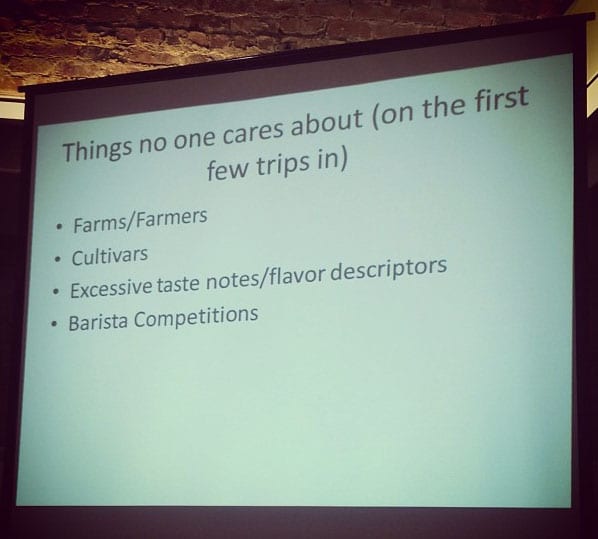
In June 2009, when Chris Baca moved from San Francisco to work for Verve Coffee, he and Jared Truby became one – Trubaca – a platonic friendship power duo with their own personal style, vocabulary, and blog. In Santa Cruz they and their crew have been known to “shred on bar” (pull shots), “make it rain” (turn the hot water tap and steam wands on at the same time), and serve up “one-and-ones” (single espresso and a single macchiato). Their unique personalities and approach to coffee translate to an innovative customer experience.
During their talk, they spoke on the importance of bringing customers in, and told the story of a man who came in who wanted the darkest coffee they had. Instead of telling the man about their approach to alternative roast styles, elevation, and their recent win at the SWRBC, they simply served the gentleman a cup of their Sermon espresso blend. He loved it. He came back. After several visits and short interactions, he noticed that the crew all drank espresso. He wanted to try it. Now, this man is a regular. They brought him in slowly and now? He loves talking about coffee, reading about source trips, and hearing about signature drink preparation.
To an outsider, a specialty shop is an intimidating one. And articles like “How Not To Be A Dick At The Coffeeshop” just make it seem like a more aggressively douchey place. Baca and Truby stressed hospitality, kindness, and patience when working behind a coffee bar.
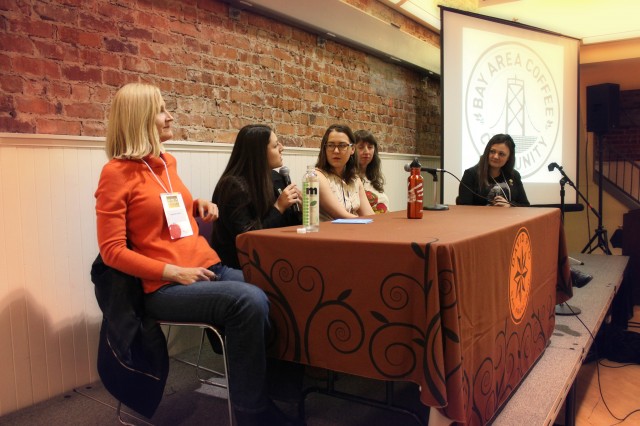
A little later in the afternoon, the inimitable Julia Barber (of Reg Barber Enterprises) lead a panel called “Doing What You Love Everyday” with Brooke McDonnell of Equator Coffee, Paola Castellanos of FairTrade USA, Katie Carguilo of Counter Culture Coffee, and Eileen Hassi of Ritual Coffee.
Brooke spoke about her recent work in Panama (with partner Helen Russell). On doing what she loves everyday? “Doing some fun stuff now. We started off doing retail, moved into roasting, now we’re doing a farm project which is pretty consuming. We have some microcredit loans, some interesting stuff, what happens if you’re lucky is that you’re surrounded by an incredible team. It frees you up and I’m incredibly lucky in the arc of my career. I’m in a nice groove right now.”
Paola Castellanos builds relationships and forges those relations on a daily basis, “from connecting businesses looking for support to producers and taking producers to trade shows.” Some of the things she loves about her work? “Being able to travel and take our partners we work to origin. Working with everyone at all stages of the supply chain.”
US Barista Champion Katie Carguilo has been based in New York for the last seven years. There, at Counter Culture Coffee, she leads classes, private trainings, and at least two cuppings per week: a public cupping on Fridays and a “cupping professionals tasting” on Monday. When not in the office, Katie visits accounts to do quality control and visit cafes around the city to taste coffee. Why? “Because I love tasting.”
For Ritual Coffee founder Eileen Hassi, no two days of the last eight years of her life have been the same. “I remember when I was building out Ritual I was painting and tiling and making trips to the hardware store.” Now, with five cafes and a roastworks in SOMA, Ritual is a household name for the specialty coffee industry, and has carved out an important niche in the San Francisco Bay Area.
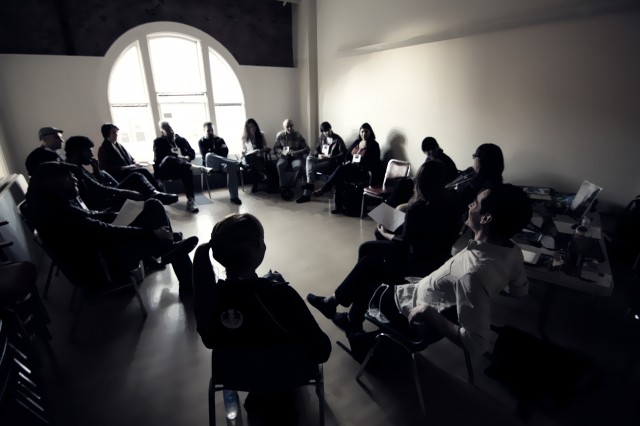
I was able to cover some, but not all of what went on at Barista Nation San Francisco; I’m just one man, after all, and I’m just the way God made me. But this kind of programming is really special, and the fact that admission is just a $10 donation to CARE is spectacular. If the programming wasn’t enough, registered guests get fed a beautiful complimentary breakfast, lunch, and dinner. And all the coffee and MetroMint water you can drink – and in the evening? Yeah, there’s beer. This was the largest Barista Nation event to date, with 285 registered baristas – raising $2200 for CARE.
We love Barista Nation! Stay tuned for our recap of the first Bay Area Coffee Community event held in conjunction with Barista Nation, and look for more cool stuff from BN throughout 2013, with a big announcement coming soon for USBC in Boston.











